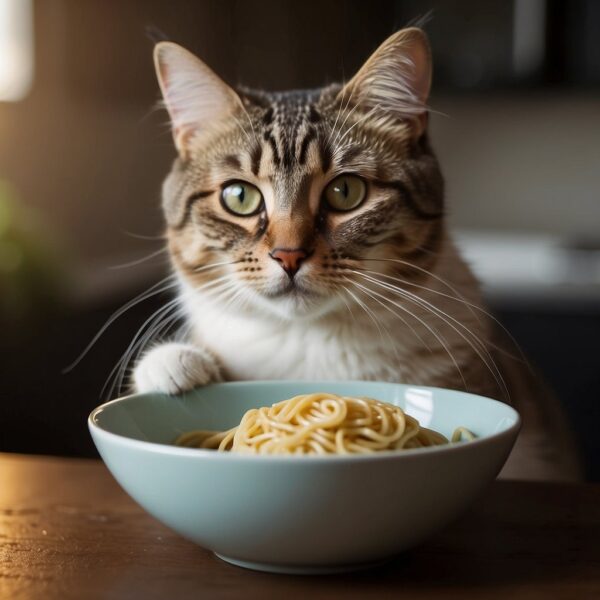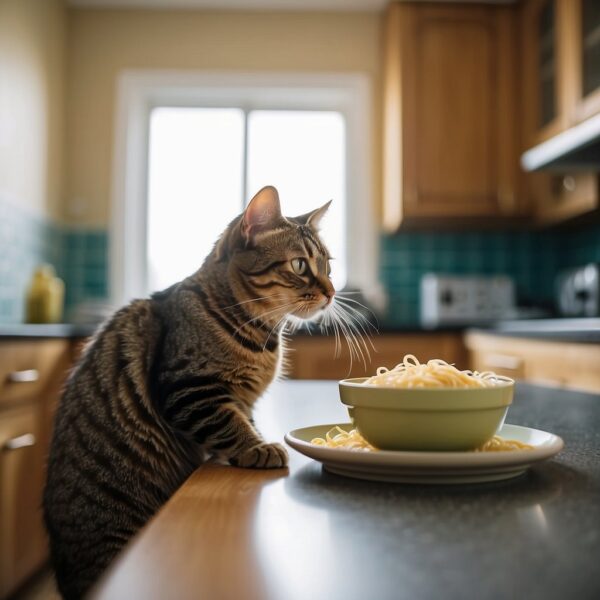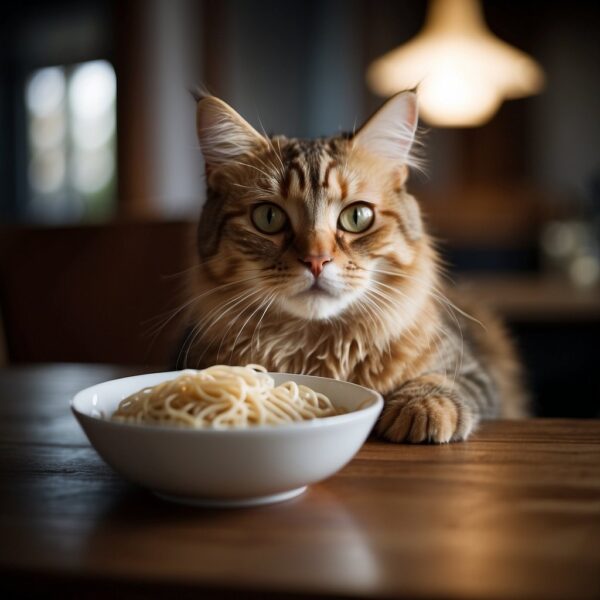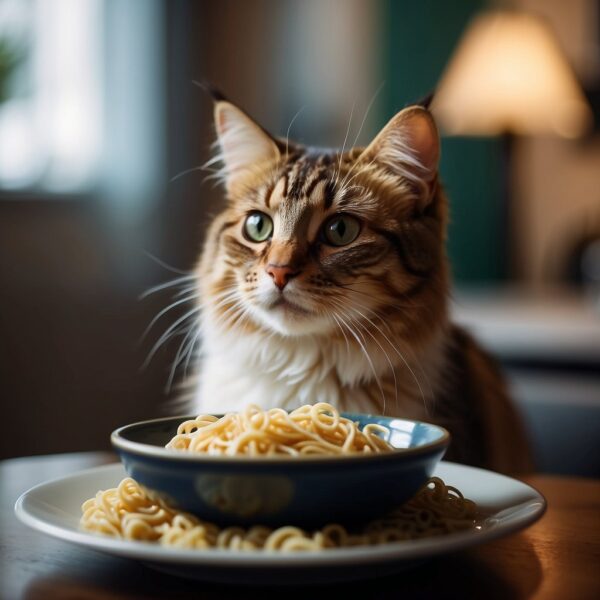
Can Cats Eat Pasta?
Cat parents might wonder if their cat can eat noodles or pasta. Noodles, a staple in many human diets, offer a variety of shapes and flavors that can sometimes be intriguing to cats. While noodles are not toxic to cats, they do not provide any necessary nutrients and could potentially lead to health complications if consumed regularly or in large quantities. Essential nutrients for cats include protein from meat, as they are obligate carnivores whose bodies are designed to process and thrive on a meat-based diet.
Moreover, the inclusion of noodles in a cat’s diet can increase the risk of obesity and other related health issues, as noodles are high in carbohydrates and lack the essential nutrients cats require. They may also contain ingredients like garlic and onions, which are harmful to cats, or be prepared with high levels of sodium, which is not suitable for feline consumption. It is vital for cat parents to understand that while an occasional plain noodle may not be harmful, a cat consistently eating noodles or replacing specialized cat food with human food can have detrimental effects on a cat’s health.
Key Takeaways for Can Cats Eat Noodles
- Noodles lack essential nutrients and may harm a cat’s health if fed regularly.
- Cats have specific dietary requirements that noodles do not meet.
- Occasional plain noodles are not toxic but should not replace cat-specific food.
Are Noodles Safe for Cats?
The question of whether cats can eat noodles safely involves considering their nutritional needs, potential harmful ingredients, and the feline digestive system.
Nutritional Considerations
Noodles do not meet cats’ nutritional needs, which require a high-protein, low-carbohydrate diet. Pasta are primarily composed of carbohydrates and while some grains can offer proteins and fats, they are not in the proportions a cat requires. Regular consumption of noodles could lead to nutritional imbalances.
Inappropriate Ingredients
Many noodle dishes contain ingredients that can be harmful to cats. Added sodium content, spices, and flavorings such as garlic and onion can be toxic to felines. Moreover, noodle dishes may include dairy or cheese sauces, which many cats are intolerant to due to lactose.
Digestive Concerns
Cats have a sensitive digestive system designed to process meat. Cats eating noodles can lead to gastrointestinal upset, resulting in symptoms like diarrhea or vomiting. Besides, grains can be hard for cats to digest causing discomfort and other digestive issues. It’s essential to monitor how a cat’s system responds to unusual foods like noodles.

Health Impacts of Feeding Noodles to Cats
A cat eating noodles and pasta can have various health implications, affecting their weight, meeting protein needs, exposing them to toxic substances, and altering hydration and sodium levels.
Weight Management
Noodles can contribute to weight gain and obesity in cats due to their high carbohydrate content and low nutritional value. Cats require a high-protein, meat-based diet, and excess carbs can lead to an imbalance in caloric intake versus expenditure.
Protein Requirements
Cats have a high requisite for protein to maintain muscle mass and overall health. Cats eating noodles, which are generally low in protein, can lead to a protein deficiency, potentially causing muscle wasting and other health issues.
Toxicity Risks
Noodles often contain ingredients that can be toxic to cats, such as onion and garlic. Even in small amounts, these can cause oxidative damage to a cat’s red blood cells, leading to stress on the body and potential health complications.
Hydration and Sodium Levels
Dehydration can occur if a cat eats noodles with high salt content, upsetting vital electrolyte balance. Additionally, seasonings and sauces often found in noodle dishes can exacerbate this issue, which may necessitate a visit to the veterinarian. It’s important that cats have access to clean water to help maintain hydration.
Potential Allergic Reactions and Food Intolerance
When introducing noodles or any new food to a cat’s diet, it is vital to monitor for potential allergic reactions. Cats can develop allergies to proteins found in foods, and noodles may contain ingredients like wheat or eggs, which can trigger an immune response.
Common signs of food allergies in cats include:
- Skin irritation or dermatitis
- Excessive scratching
- Hair loss
- Gastrointestinal issues such as vomiting or diarrhea
A cat may also suffer from food intolerance, which is a non-immune related sensitivity to certain food components. Symptoms of food intolerance can be similar to those of food allergies, but they typically manifest as digestive problems rather than skin issues.
Symptoms of food intolerance may include:
- Frequent stomach upset
- Vomiting
- Diarrhea
- Flatulence
In both cases, the cat’s system does not adequately process the offending component. Unlike food allergies, intolerances do not involve the immune system, but rather a direct reaction from the digestive system, often due to the lack of specific enzymes required to break down certain foods.

Understanding Cats as Obligate Carnivores
Cats, distinguished from other pets, are defined as obligate carnivores. This classification means their survival depends primarily on nutrients found in animal flesh. Unlike omnivores or facultative carnivores, cats have evolved to derive their nutritional necessities exclusively from meat.
The key components that make meat essential to a cat’s diet include:
- Proteins: High-quality proteins are crucial for maintaining muscle health and facilitating proper body functions.
- Vitamins: Cats require specific vitamins such as Vitamin A and B-complex, which are abundant in animal tissues.
- Minerals: Minerals such as taurine and arachidonic acid, which are not found in plant-based foods, are integral to feline health.
The reliance on an animal-based diet is underscored by the cat’s digestive system, which is optimized for processing meat. This system has a reduced capacity to digest carbohydrates and an increased ability to break down proteins into amino acids, the building blocks that sustain their physiological processes.
Here’s a concise overview of why obligate carnivores like cats need meat:
| Nutrient | Importance to Cats |
|---|---|
| Proteins | Supports muscle repair, growth, and overall metabolism |
| Vitamins | Necessary for immune function and energy production |
| Minerals | Crucial for heart health and reproductive systems |
In sum, while cats may exhibit curiosity towards foods like noodles, their bodies are not adapted to utilize such foods effectively. Cat parents must provide a meat-based diet to align with their cat’s inherent dietary requirements, thereby promoting optimal health and wellbeing.

Commercial Cat Foods Vs. Human Foods
When considering cat nutrition, there’s a clear distinction between commercial cat foods and human foods. Cat foods are specifically formulated to meet the nutritional needs of felines, who are obligate carnivores. Dry and wet cat food is a popular option that provides a balanced diet with the necessary nutrients cats need, often enriched with vitamins, minerals, and amino acids like taurine, which are essential for cats’ health.
On the other hand, human foods can vary widely in nutrient content. While certain human foods may serve as a treat for cats, they should not replace commercial cat foods as the main dietary source. Human foods often lack key nutrients tailored for cats and can result in nutritional imbalances. For example, cats require more protein and certain fats than humans do, and these are effectively provided in commercial cat foods.
Furthermore, frequent indulgence in human foods can lead to weight-related issues in cats, such as obesity and its associated health risks. A treat is generally considered safe when it comprises no more than 10% of a cat’s daily caloric intake.
Below is a brief comparison between the two:
| Aspect | Commercial Cat Foods | Human Foods |
|---|---|---|
| Nutrition | Complete & balanced for cats | Unbalanced for feline diets |
| Nutrients | Specifically tailored for cat’s health | May lack necessary cat-specific nutrients |
| Weight Issues | Formulated to maintain healthy weight | Can contribute to obesity |
| Convenience | Designed for easy daily feeding | Requires preparation and moderation |
In conclusion, while some human foods can be given to cats as treats, commercial cat foods should remain the cornerstone of a cat’s diet to ensure proper nutrition and prevent health problems.
Frequently Asked Questions
Cats can eat noodles and pasta in moderation, but there are several considerations to be aware of when it comes to sauces, certain types of noodle products, and a cat’s overall diet. It is best to not introduce noodles into your cat’s diet.
Are noodles a safe food item for cats?
Noodles made from wheat or rice can be safe for cats if offered in small amounts. However, they should be plain, without added salt, fats, or seasonings, as these ingredients can be harmful to their health.
Is pasta with any form of sauce healthy for cats to consume?
Pasta sauces often contain ingredients like onions, garlic, and excessive amounts of salt which are toxic to cats. Therefore, cats should only eat plain pasta, free from such sauces and seasonings.
What are the risks of feeding Maggi noodles to cats?
Maggi noodles, and other similar instant noodle products, often contain high levels of sodium and MSG, which can lead to sodium ion poisoning and other health issues in cats.
Can noodle soup be included in a feline’s diet without any health concerns?
Noodle soups typically contain ingredients that are not safe for cats, such as onions, garlic, and excessive salt. It is best to avoid including noodle soup in a cat’s diet.
Are there any human foods that are completely safe for cat consumption?
While some human foods, like certain cooked meats and vegetables, can be safe for cats, it is crucial to consult with a veterinarian to ensure these foods meet the specific nutritional needs of the feline and are served in appropriate amounts.
What should I avoid feeding my cat to ensure their well-being?
To ensure a cat’s well-being, avoid foods that are toxic to them, such as chocolate, caffeine, alcohol, onions, garlic, grapes, and raisins. Stick to high-quality cat food or consult with a veterinarian for a suitable diet plan.